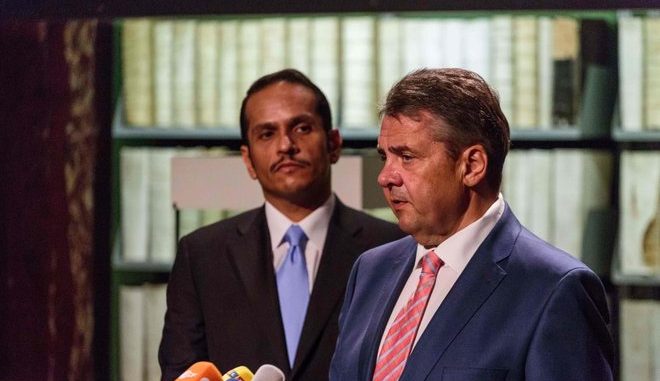
Saudi / UAE decision to release list deepened standoff that has already cut diplomatic relations, travel & trade to Qatar, w critical food supplies now imported by air from Turkey and elsewhere. Some entries on the list are likely to raise questions in the West. List also includes several Bahraini opposition groups that appear to have little or no relation to Qatar, a tiny country w about 300,000 citizens and more than two million foreign workers,. It also is the host to both largest US and Turkish military bases in the Gulf, and a major exporter of natural gas. German foreign minister attributed escalation of dispute to dangerous “Trumpification” of Persian Gulf politics. “Such a Trumpification of relations is particularly dangerous in region already rife w crises,” he said in apparent reference to Trump’s tweet he had encouraged Sunni Arab states to take action against Qatar. Top: German Foreign Minister Sigmar Gabriel w Qatar Foreign Minister Mohammed al-Thani Friday in Wolfenbuettel, Germany, Below: Secretary of State Rex “Empty Suit” Tillerson, following his call on countries in the Middle East to ease their blockade on Qatar, while moron Trump encourages the conflict.
Escalating a feud among Persian Gulf monarchs, Saudi Arabia and the United Arab Emirates on Friday listed 59 people and a dozen organizations said to be “aiding terrorism”
and having links to Qatar, including prominent Qatari businessmen, politicians and royalty.
The move came on the same day the idiot Trump regime sent mixed messages about the deepening crisis:
Just minutes after Secretary of State Rex W. Tillerson urged calm and an easing of the embargo on Qatar,
moron Trump again publicly accused the country of funding terrorism.
Qatari officials have repeatedly denied supporting terrorist groups and
said the emirate works closely with Western security agencies to crack down on terrorist financing.
The decision of the Saudis and Emiratis to release the list deepened a standoff that has already included
a cutoff of all diplomatic relations, travel and trade with Qatar,
forcing it to import critical food supplies by air from Turkey and elsewhere.
Qatar, a tiny country with a population of about 300,000 citizens and more than two million foreign workers, is
both the host to the largest American air base in the region and a major exporter of natural gas.
Its confrontation with its neighbors has threatened to tear apart the alliance of petroleum-rich gulf monarchies that is crucial to US efforts to contain Iran.
Tensions between the two sides over questions of power and autonomy date back at least two decades.
But at the core of the current dispute is Qatar’s support for the Arab Spring revolts of 2011,
in particular the Muslim Brotherhood-style Islamists who at the time appeared poised to win elections across the region.
Qatar saw an alliance with the Brotherhood and its movement as a hedge against dominance by Saudi Arabia;
Saudi Arabia and the United Arab Emirates saw the same forces as a threat to the stability of their governments and the region.
The Saudi and Emirati list was issued on Friday as the German foreign minister appeared with his Qatari counterpart on a visit to Wolfenbüttel, Germany.
Germany’s foreign minister, Sigmar Gabriel, had previously attributed the escalation of the dispute
to what he called a dangerous “Trumpification” of regional politics.
“Such a Trumpification of relations with one another is particularly dangerous in a region that is already rife with crises,”
he told the German newspaper Handelsblatt in an apparent reference to President Trump’s suggestion on Twitter
that he had encouraged the other Arab states to take action against Qatar as a sponsor of extremism.
The new Saudi and Emirati list includes some people already designated as terrorist fund-raisers by the West.
They include Hajjaj al-Azmi, a Kuwaiti who is sometimes in Doha, the capital of Qatar.
It also includes at least one Libyan group, the Defend Benghazi Brigades,
which has included people and organizations designated as terrorists or aiding terrorism by the West.
Many Libyans believe elements of the Brigades have received support from Qatar.
Also on the list is a former Qatari interior minister, Abdullah Bin Khalid Al-Thani,
who is a member of the royal family but had been accused in the past of ties with extremists in the period before the Sept. 11, 2001, terror attacks.
Some entries on the list are likely to raise questions in the West.
It includes the former Egyptian Islamist militant Tarek el-Zomor, who
- served a jail sentence,
- renounced violence,
- participated in electoral politics and
- is believed to have fled to Qatar after the military takeover in Cairo in 2013.
Another is Yusuf al-Qaradawi, an Egyptian-born Muslim cleric and scholar associated with the Muslim Brotherhood who years ago became a citizen of Qatar.
Qaradawi has sometimes endorsed violence against Israel,
but he is usually considered a preacher rather than a militant or terrorist fund-raiser.
The list also includes several Bahraini opposition groups that appear to have little or no relation to Qatar.
The Qatari-owned news organization Al Jazeera reported that 18 of the people on the list were Qatari citizens.
Several Qatari charities were also named, and Qatar denied that they were involved in financing terrorism.
Egypt — which has become a close ally of Saudi Arabia and the UAE since the military takeover in 2013 — also endorsed the list.
Source: Saudis and Emiratis List Dozens Linked to Qatar as Aiding Terrorism – The New York Times
